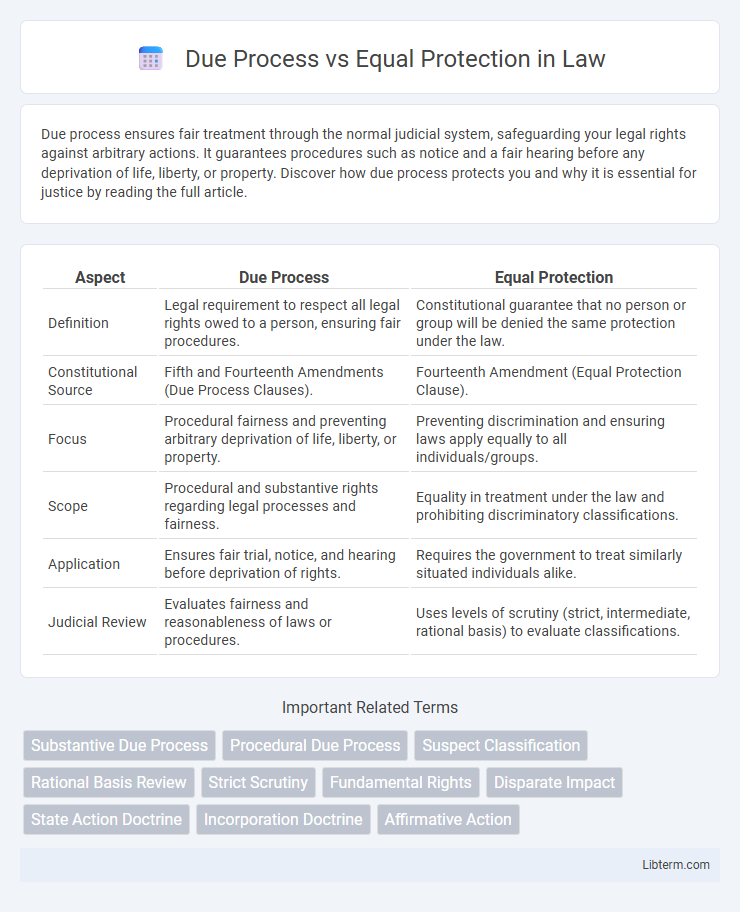Due process ensures fair treatment through the normal judicial system, safeguarding your legal rights against arbitrary actions. It guarantees procedures such as notice and a fair hearing before any deprivation of life, liberty, or property. Discover how due process protects you and why it is essential for justice by reading the full article.
Table of Comparison
| Aspect | Due Process | Equal Protection |
|---|---|---|
| Definition | Legal requirement to respect all legal rights owed to a person, ensuring fair procedures. | Constitutional guarantee that no person or group will be denied the same protection under the law. |
| Constitutional Source | Fifth and Fourteenth Amendments (Due Process Clauses). | Fourteenth Amendment (Equal Protection Clause). |
| Focus | Procedural fairness and preventing arbitrary deprivation of life, liberty, or property. | Preventing discrimination and ensuring laws apply equally to all individuals/groups. |
| Scope | Procedural and substantive rights regarding legal processes and fairness. | Equality in treatment under the law and prohibiting discriminatory classifications. |
| Application | Ensures fair trial, notice, and hearing before deprivation of rights. | Requires the government to treat similarly situated individuals alike. |
| Judicial Review | Evaluates fairness and reasonableness of laws or procedures. | Uses levels of scrutiny (strict, intermediate, rational basis) to evaluate classifications. |
Introduction to Due Process and Equal Protection
Due Process guarantees fair treatment through the judicial system, ensuring that individuals are not deprived of life, liberty, or property without appropriate legal procedures. Equal Protection mandates that no person or group be denied the same protection under the law, safeguarding against discriminatory treatment by the government. Both doctrines are fundamental principles derived from the Fourteenth Amendment, shaping the constitutional framework for civil rights and liberties.
Historical Background of Due Process
The historical background of Due Process traces back to the Magna Carta of 1215, establishing the principle that no person shall be deprived of life, liberty, or property without lawful judgment. This concept evolved through English common law and was embedded in the Fifth and Fourteenth Amendments of the U.S. Constitution to protect individuals from arbitrary government actions. Due Process ensures procedural fairness and legal safeguards in judicial and administrative proceedings.
Evolution of Equal Protection Clause
The Equal Protection Clause, part of the Fourteenth Amendment ratified in 1868, has evolved through landmark Supreme Court cases such as Brown v. Board of Education (1954), which dismantled racial segregation by affirming equality under the law. This clause ensures states provide equal protection to all individuals, addressing discriminatory laws and practices across race, gender, and other classifications. Its interpretation continues to expand, influencing civil rights, voting rights, and gender equality, distinguishing it from Due Process, which primarily safeguards procedural and substantive legal fairness.
Key Differences Between Due Process and Equal Protection
Due Process guarantees fair legal procedures and safeguards against arbitrary government actions, ensuring individuals receive notice and an opportunity to be heard before deprivation of life, liberty, or property. Equal Protection mandates that laws and government actions apply uniformly, prohibiting discrimination against individuals or groups based on characteristics like race, gender, or nationality. The key difference lies in Due Process focusing on procedural fairness, while Equal Protection emphasizes substantive fairness in the application of laws.
Major Supreme Court Cases Involving Due Process
Major Supreme Court cases involving due process include *Lochner v. New York* (1905), where the Court struck down labor regulations on the grounds of economic liberty under substantive due process. In *Gideon v. Wainwright* (1963), the Court expanded procedural due process by guaranteeing the right to legal counsel in criminal cases. *Obergefell v. Hodges* (2015) emphasized fundamental rights under substantive due process by recognizing same-sex marriage nationwide.
Landmark Equal Protection Cases
Landmark Equal Protection cases include Brown v. Board of Education, which declared racial segregation in public schools unconstitutional, and Loving v. Virginia, which invalidated laws prohibiting interracial marriage. These decisions reinforced the principle that laws must not discriminate against individuals or groups without sufficient justification under the Equal Protection Clause of the 14th Amendment. Equal Protection challenges often address government actions that treat people differently based on race, gender, or other protected characteristics.
How Due Process Protects Individual Rights
Due Process protects individual rights by ensuring fair procedures and legal safeguards before the government can deprive a person of life, liberty, or property, as guaranteed under the Fifth and Fourteenth Amendments. This doctrine mandates notice, a fair hearing, and an impartial tribunal, thereby preventing arbitrary or unjust government actions. Due Process also encompasses both procedural protections and substantive limitations, securing fundamental rights such as privacy, freedom of speech, and property ownership from infringement.
Equal Protection and Anti-Discrimination Laws
Equal Protection under the 14th Amendment ensures individuals receive the same legal protections regardless of race, gender, or other characteristics, forming the constitutional foundation for anti-discrimination laws. Key statutes like the Civil Rights Act of 1964 and the Americans with Disabilities Act enforce equal treatment in employment, education, and public services. Courts apply strict scrutiny to discrimination cases involving suspect classifications, reinforcing the principle that unjustified differential treatment violates constitutional rights.
Due Process vs Equal Protection: Practical Applications
Due Process ensures legal fairness by protecting individuals from arbitrary government actions in criminal and civil procedures, while Equal Protection mandates that laws apply equally to all individuals without discrimination. In practical applications, Due Process is critical in judicial hearings and criminal trials to safeguard procedural rights, whereas Equal Protection is pivotal in cases involving discrimination based on race, gender, or other classifications. Both principles guide courts in evaluating legislation and government conduct, ensuring justice and equality under the Constitution.
Challenges and Future Perspectives
Challenges in Due Process and Equal Protection center on balancing individual rights with governmental interests amid evolving social norms and technological advancements. Future perspectives emphasize integrating artificial intelligence in judicial decision-making to enhance fairness while addressing concerns about bias and accessibility. Legal reforms aim to harmonize procedural safeguards with substantive equality to ensure comprehensive protection under constitutional law.
Due Process Infographic

 libterm.com
libterm.com